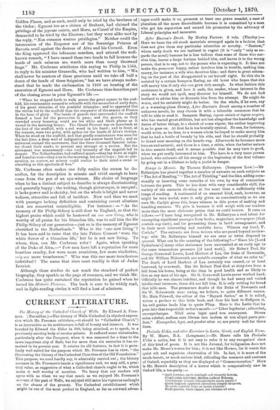After Baxtow's Death. By Morley Farrow. 3 vols. (Tinsley.)-- Here
we have the old stock materials arranged again in a fashion that does not give them any particular attraction or novelty. "Bartow,"' whose early death we are inclined to regret (it is " early " only as re- gards the novel) because he is less tedious than some of those who sur- vive him, leaves a large fortune behind him, and leaves it to the wrong: person, that is to say, not to the person who is expecting it. It does not make the possessor happy, rather involves him in trouble, making him. marry, for instance, a wife who deceives him ; and there is great schem- ing on the part of the disappointed to set herself right. In this she is assisted by a certain Sampson Baring, an old lover who hopes that she will marry 'aim if only she can grow rich enough. In what fashion this assistance is given, and how it ends, the reader, whose interest in the. story we would not spoil, may discover for himself. We do not feel inclined to advise him or dissuade him from the attempt. He might do- worse, and he certainly might do better. On the whole, if he sees, say at a watering-place library, After Baxtow's Death among a number of unknown novels, he may choose it with a tolerable assurance that he. will be able to read it. Sampson Baring, ingens animis et ingens corpore, who has wasted great abilities, but not lost altogether the knowledge and' desire of better things, is a sketch of some vigour, the author improving- it as he goes on. At first he is too brutally cynical. No one, for instance,. would write, as he does, to a woman whom he hoped to make marry hittl that he had a bottle of brandy by his side, and that ho should probably be found next morning on the hearth-rug. Afterwards he becomes more, human and natural ; and there is a time, a crisis, when the better nature in him asserts itself, and it seems possible that he may turn to good, when we get really interested in him. The hero is a very tame person indeed, who exhausts all his energy at the beginning of the first volume by going out in a lifeboat to help a yacht in danger.






























 Previous page
Previous page